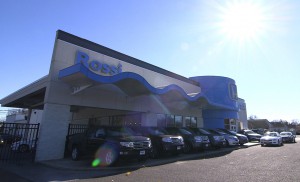As warnings go it wasn’t exactly a call to abandon ship, but it was a reminder that the auto sales boom of recent years is losing steam.
But Ally Financial Inc., which once upon a time was the financial arm of General Motors known as GMAC, has warned investors that its profit might not grow as quickly as it once thought because the demand for new cars is shifting.
After two consecutive years of record sales, analysts are predicting another big year for auto sales in 2017. But the price that carmakers are paying to maintain that pace is climbing.
The push is leading to more aggressive discounting and the heavier use of leasing to boost sales has created a glut of used cars, according to Ally.
Earnings may increase as little as 5% this year, Ally told investors this week. Back in January Ally Chief Executive Officer Jeffrey Brown in January predicted growth “shy of 15% but still very solid.”
Consumers have turned to leasing more than ever to lower their monthly payments on new vehicles that have been selling at record high prices in the U.S. The National Automobile Dealers Association’s Used Car Guide index declined 3.8% in February, the eighth consecutive drop and the steepest since November 2008.
(Ford taking 50% hit to Q1 earnings. Click Here for details.)
“If you look at the average monthly payment consumers are making now it’s about $470 per month it with a $30,000 loan balance. Five years ago it was $460 per month on a $25,000 loan balance,” Toyota’s top executive, Jim Lentz, told TheDetroitBureau. “So consumers have done every they can to stretch affordability,” Lentz said.
Chris Halmy, Ally’s chief financial officer, said the Ally now expects used-car prices will drop by about 5% in 2017, similar to last year.
Used-car price declines also can force auto lenders to boost provisions against future losses, since the collateral on their loans is becoming less valuable. Falling vehicle values also reduce the amounts finance companies can recover on repossessed cars.
While Ally had expected a 5% drop in used-car prices in the near term, the lender saw a 7% slide in the first quarter, which could cost $15 million to $20 million, Halmy said during a Tuesday conference call with analysts.
(Click Here for details about car buyers getting longer loans.)
Ally also predicted a modest increase in bad loans, which could grow from 1.2% of its portfolio to 1.4% to 1.6%.
Consumer losses have also been drifting higher, most notably in lower credit tiers, Halmy said.
As carmakers lease vehicles, they charge the customer a monthly payment based on an assumption of the car or truck’s value when it’s returned for resale. If autos are depreciating more than expected, losses can pile up. Last fall, Ford Credit cut $300 million from its profit estimate for 2017 because of the drop in used-car prices. Lower used vehicle prices also lure customers away from the new vehicle market.
Toyota Motor Corp., Honda Motor Co., and Nissan Motor Co. may also see operating profit drop this year because of declining used-car values, according to a report from Takaki Nakanishi, an analyst at Jefferies Group LLC.
(Leasing levels surge, raise concern. Click Here to see why.)
“Auto we think is going to slow down because people will stress on credit,” Jamie Dimon, chief executive officer of JPMorgan Chase & Co., said at the company’s investor day on Feb. 28. “You’re going to see some issues there, but it’s not systemic.”


